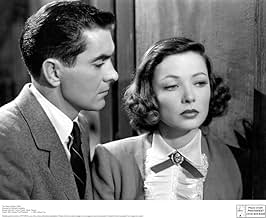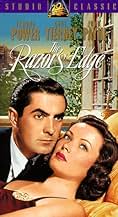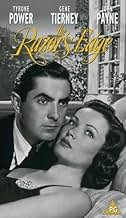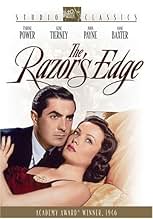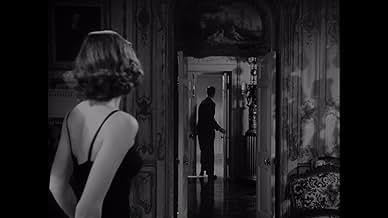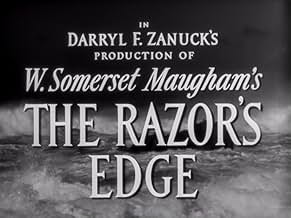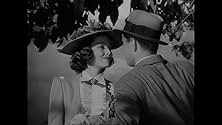NOTE IMDb
7,3/10
7,2 k
MA NOTE
Ajouter une intrigue dans votre langueAn adventuresome young man goes off to find himself and loses his socialite fiancée in the process. But when he returns 10 years later, she will stop at nothing to get him back, even though ... Tout lireAn adventuresome young man goes off to find himself and loses his socialite fiancée in the process. But when he returns 10 years later, she will stop at nothing to get him back, even though she is already married.An adventuresome young man goes off to find himself and loses his socialite fiancée in the process. But when he returns 10 years later, she will stop at nothing to get him back, even though she is already married.
- Réalisation
- Scénario
- Casting principal
- Récompensé par 1 Oscar
- 6 victoires et 3 nominations au total
Dorothy Abbott
- Showgirl
- (non crédité)
George Adrian
- Party Guest
- (non crédité)
Demetrius Alexis
- Abbe
- (non crédité)
Olga Andre
- Minor Role
- (non crédité)
John Ardell
- Banker
- (non crédité)
Frank Arnold
- Miner
- (non crédité)
- …
Juan Arzube
- Minor Role
- (non crédité)
Avis à la une
Producer Darryl F. Zanuck fashioned a major production for Tyrone Power upon his return to 20th Century Fox after a stint in the military service. No expense was spared in terms of production values, and special care was taken to cast each role to "perfection."
With master story teller W. Somerset Maugham joining in writing the screenplay from his sprawling, multi-character novel, and Edmund Gouling doing the direction and Alfred Newman the score, it was a setup that couldn't miss.
The cast works at a thoroughly respectable level, and the film emerges likewise. Yet, it falls strangely short of the genuine masterpiece Zanuck obviously planned.
There is a rather cold center to "The Razor's Edge," which prevents one from being able to completely empathize with and feel for these characters and their respective plight. While they are interesting, the characters fail to ignite a deep emotional response in the viewer. One ends more observing this enactment, which has the feel of a somewhat slick presentation.
It also represents the best of what 20th Century Fox had to offer in the mid-forties. Power next went on to do "Nightmare Alley," for which he received some of the best notices of his lengthy film career.
With master story teller W. Somerset Maugham joining in writing the screenplay from his sprawling, multi-character novel, and Edmund Gouling doing the direction and Alfred Newman the score, it was a setup that couldn't miss.
The cast works at a thoroughly respectable level, and the film emerges likewise. Yet, it falls strangely short of the genuine masterpiece Zanuck obviously planned.
There is a rather cold center to "The Razor's Edge," which prevents one from being able to completely empathize with and feel for these characters and their respective plight. While they are interesting, the characters fail to ignite a deep emotional response in the viewer. One ends more observing this enactment, which has the feel of a somewhat slick presentation.
It also represents the best of what 20th Century Fox had to offer in the mid-forties. Power next went on to do "Nightmare Alley," for which he received some of the best notices of his lengthy film career.
To repeat, this film has everything going for it: top-notch cast, direction, no expense spared in production. It achieved an enthusiastic audience response when it came out. Why does it leave me dissatisfied?
First, it is hard to adapt a complex novel for the stage or screen. It's not impossible. Great authors, Charles Dickens for one, adapted their work for the stage. Some Dickens novels, "Great Expectations" and "Oliver Twist," at the very same time this film was being made, reached the screen magnificently in slimmed-down versions. Not this one. Apparently, Somerset Maugham prepared a screenplay. It was not used. Perhaps that was the mistake. The screenplay that was used follows the novel. But it fails to capture the essence.
Larry, the protagonist, is disillusioned with life, a reasonable reaction to WW I. He goes on his quest for spiritual enlightenment, as in the novel. He finds it, more or less. But what is it? We never know. The novel includes a long digression on that point. The movie omits it. We are left with a rather kitschy picture of a pleasant, peaceful fellow, who tells us he is well on the road to Truth, but never gives us a sign or even a signpost, neither in his speech nor in his behavior. Yet his spiritual search is presented as the key to the whole story. He seeks meaning in the quartiers populaires of Paris and in the coal mines of Picardy. Fine. I had a high school friend who disdained bourgeois life and went off to find fulfillment as a dockworker in Milwaukee. He found egotism. He came away with a happy sense of superiority that let him look down on parasitic rich people. Our Larry goes on to see the guru in the Himalayas. What profound wisdom does he imbibe? We are given no clue. He shuts himself up in a mountaintop retreat, after which he has seen It (capital I) - whatever It is. He can now face mankind. It's an old practice, not confined to Indian gymnosophists. St. Anthony and his fellows, the Desert Fathers, isolated themselves. But the aim was not to rejoin the world. It was to transcend it. Abba Macarius (or one of his fellow desert saints - I'm not sure which) was said to be so otherworldly that his disciples had to hold him down lest his body along with his spirit soar to the realm of God. Larry keeps his feet firmly planted. He returns to society. How is he changed? I can't see it. Tyrone Power plays the very same faintly vacuous character he was before. How does he use his great enlightenment? A little hypnotism to relieve John Payne of chronic migraines. He becomes a one-man AA to cure Sophie off the sauce. (Sophie, by the way, is the only skid-row alcoholic I have ever imagined who can be tracked down because she won't settle for anything less than hugely expensive liqueur.) Now I'm not calling for the movie to add a heavy explanation of transcendental spirituality. But since this is the crux of the story, we ought to get something - instead of nothing.
Anne Baxter richly deserved an Oscar. The rest of the cast makes little impression. Tyrone Power I love as an actor. He just didn't get into this character. Clifton Webb, as usual, is supremely supercilious. No one, except maybe Gladys Cooer, did superciliousness better. But that's it. Cecil Humphreys is a perfectly manicured, made-for-Hollywood yogi. They would have done far better with Sam Jaffe as he was in "Lost Horizon," a really mysterious and effective Wise Man. Gene Tierney - I hate to say it because she was marvelous in many roles - does nothing with this role. It demands much more bite. She is presented as materialistic, self-satisfied, a contrast to the ever-searching Larry. She needs to have, a touch at least, of a hard edge. Gene Tierney is sweetness all the way through, even as she commits one of the cruelest acts put on the screen. Who can sympathize with a person who deliberately inveigles a recovering alcoholic into a room, then plants her alone with a bottle of booze and a glass? The movie cries out for Claire Trevor.
Larry goes off to be a dockworker, or something. Everyone left alive resumes life as before. And we leave the movie theater, or our DVD, with ... what? The novel demands better than that.
First, it is hard to adapt a complex novel for the stage or screen. It's not impossible. Great authors, Charles Dickens for one, adapted their work for the stage. Some Dickens novels, "Great Expectations" and "Oliver Twist," at the very same time this film was being made, reached the screen magnificently in slimmed-down versions. Not this one. Apparently, Somerset Maugham prepared a screenplay. It was not used. Perhaps that was the mistake. The screenplay that was used follows the novel. But it fails to capture the essence.
Larry, the protagonist, is disillusioned with life, a reasonable reaction to WW I. He goes on his quest for spiritual enlightenment, as in the novel. He finds it, more or less. But what is it? We never know. The novel includes a long digression on that point. The movie omits it. We are left with a rather kitschy picture of a pleasant, peaceful fellow, who tells us he is well on the road to Truth, but never gives us a sign or even a signpost, neither in his speech nor in his behavior. Yet his spiritual search is presented as the key to the whole story. He seeks meaning in the quartiers populaires of Paris and in the coal mines of Picardy. Fine. I had a high school friend who disdained bourgeois life and went off to find fulfillment as a dockworker in Milwaukee. He found egotism. He came away with a happy sense of superiority that let him look down on parasitic rich people. Our Larry goes on to see the guru in the Himalayas. What profound wisdom does he imbibe? We are given no clue. He shuts himself up in a mountaintop retreat, after which he has seen It (capital I) - whatever It is. He can now face mankind. It's an old practice, not confined to Indian gymnosophists. St. Anthony and his fellows, the Desert Fathers, isolated themselves. But the aim was not to rejoin the world. It was to transcend it. Abba Macarius (or one of his fellow desert saints - I'm not sure which) was said to be so otherworldly that his disciples had to hold him down lest his body along with his spirit soar to the realm of God. Larry keeps his feet firmly planted. He returns to society. How is he changed? I can't see it. Tyrone Power plays the very same faintly vacuous character he was before. How does he use his great enlightenment? A little hypnotism to relieve John Payne of chronic migraines. He becomes a one-man AA to cure Sophie off the sauce. (Sophie, by the way, is the only skid-row alcoholic I have ever imagined who can be tracked down because she won't settle for anything less than hugely expensive liqueur.) Now I'm not calling for the movie to add a heavy explanation of transcendental spirituality. But since this is the crux of the story, we ought to get something - instead of nothing.
Anne Baxter richly deserved an Oscar. The rest of the cast makes little impression. Tyrone Power I love as an actor. He just didn't get into this character. Clifton Webb, as usual, is supremely supercilious. No one, except maybe Gladys Cooer, did superciliousness better. But that's it. Cecil Humphreys is a perfectly manicured, made-for-Hollywood yogi. They would have done far better with Sam Jaffe as he was in "Lost Horizon," a really mysterious and effective Wise Man. Gene Tierney - I hate to say it because she was marvelous in many roles - does nothing with this role. It demands much more bite. She is presented as materialistic, self-satisfied, a contrast to the ever-searching Larry. She needs to have, a touch at least, of a hard edge. Gene Tierney is sweetness all the way through, even as she commits one of the cruelest acts put on the screen. Who can sympathize with a person who deliberately inveigles a recovering alcoholic into a room, then plants her alone with a bottle of booze and a glass? The movie cries out for Claire Trevor.
Larry goes off to be a dockworker, or something. Everyone left alive resumes life as before. And we leave the movie theater, or our DVD, with ... what? The novel demands better than that.
W Somerset Maugham's is a character in his own "The Razor's Edge". He's played by Herbert Marshall and he's given the hardest lines to deliver: "He looks extraordinarily happy, calm yet aloof" He's talking about Larry, Tyrone Power's character, after his enlightening trip to India. Power returns and reintroduces himself in the life of Isabel, played by the impossibly beautiful Gene Tirney. The world that Powers discovers in India will give this all consuming melodrama a spiritual tinge. Edmund Goulding choreographs the unfolding with surprising results. Tirney's beauty permeates the whole film and her character is as truthful as it is cruel although she doesn't mean to be neither truthful nor cruel. Anne Baxter as the tragic Sophie gets an Academy Award while Clifton Webb camps it out shamelessly. Loved the scene of the coin and John Payne's headache. Gene Tirney's reaction to Tyrone Power, as he works the "miracle", is the best acting of her entire career. Deserves to be seen.
Old Hollywood was always in trouble when dealing with Deep Think. That's because of the medium's commercial nature. When flirting with spiritual or religious beliefs, the studios simply didn't want to risk offending potential ticket buyers. So, when dealing with Deep Think (not their many biblical epics which were unabashedly Christian), the studios compromised to the point of absurdity by either flattening out the message or trivializing it. Here it's trivialized. After all, who's against Goodness. As a result, we wait 145-minutes to find out that, yes, Goodness is in fact a good and noble thing, and with that, Larry (Power) is on his way to enlightenment. And naturally, no one's offended, except maybe those who had expected something more.
Of course, the profundity is wrapped in lavishly mounted studio soap opera, with two of Hollywood's most beautiful people surrounded by whirling hosts of well-clothed extras. In fact, that opening ballroom scene is a marvel of orchestrated staging as the characters are introduced by serially playing off one another.
At the spectrum's other end, however, is that dreadful monastery scene with its painted mountain backdrop and facile dialog. Flattening the import of that pivotal scene are the repeated references to god as though that's where all paths must inevitably lead. And that's along with the spectacular alpine vistas fairly shouting celestial light from a heavenly above. I'm sure all that window dressing comforted nervous audiences who could then wink at Larry's spiritual quest and not feel the least bit threatened. But it also reduced a profound subject to a superficial level.
Another area that gets a Hollywood treatment are values and class, always tricky topics for an industry backed by Wall Street. The movie goes to pains circulating Larry among the gilded elite of Chicago as epitomized by the petulantly snobbish Templeton (Webb) and the selfishly insulated Isabel (Tierney). But, the elite's values are clearly materialistic, a spiritual dead-end in Larry's view as he heads off to learn from suffering with the working class. The screenplay thus sets up an implicit critique of the gilded class and the values that guide them. Well and good. But then the screenwriters can't seem to decide what to do with this point of view; after all, that's another touchy topic among audiences, especially coming so soon after the societal upheaval of the 1930's.
As a result, Larry never really criticizes the peer group he's been a part of, never really explains, that is, why he sees his social class as a spiritual dead-end, which of course would delve into a socially touchy subject. Nor, for that matter, does Larry explain why "salvation" lies through sharing a working class experience. We're left, I guess, to suppose the answer has to do with the suffering caused by hard physical labor and poor pay this class must endure. This subtext, however, is never really brought to the surface and remains unresolved at movie's end. Thus, big studio TCF and its head honcho, producer Zanuck, nibble around a second tinderbox topic, tantalizing us but never really delivering.
The movie does have a definite upside. For one, it's exquisitely well photographed, compensating somewhat for the 2-hour-plus run time. At the same time, the ballroom scenes are especially well choreographed and lavishly upholstered, creating an impressive air of wealth and breeding that makes Larry's renunciation a genuine material sacrifice. Then too, there's Webb's lively version of an unregenerate snob, a character he could do to waspish perfection. Also, Marshall's quietly observant author provides a needed contemplative note. However, in the film's pivotal role Power fails to provide the needed depth his character requires, or as another reviewer observes, Larry is pretty much the same after his trip to India as he was before. Fortunately, Power would later find that depth in Nightmare Alley (1947).
All in all, the movie remains an overlong visual treat that fortunately includes the exquisite Tierney. But as one might expect from old Hollywood, the film fails crucially at coming to grips with its two overriding themes—spirituality and class. As a result, two of life's most important questions are given unchallenging treatment. In short, here as elsewhere, where Deep Think is concerned, commercialism precedes all else.
Of course, the profundity is wrapped in lavishly mounted studio soap opera, with two of Hollywood's most beautiful people surrounded by whirling hosts of well-clothed extras. In fact, that opening ballroom scene is a marvel of orchestrated staging as the characters are introduced by serially playing off one another.
At the spectrum's other end, however, is that dreadful monastery scene with its painted mountain backdrop and facile dialog. Flattening the import of that pivotal scene are the repeated references to god as though that's where all paths must inevitably lead. And that's along with the spectacular alpine vistas fairly shouting celestial light from a heavenly above. I'm sure all that window dressing comforted nervous audiences who could then wink at Larry's spiritual quest and not feel the least bit threatened. But it also reduced a profound subject to a superficial level.
Another area that gets a Hollywood treatment are values and class, always tricky topics for an industry backed by Wall Street. The movie goes to pains circulating Larry among the gilded elite of Chicago as epitomized by the petulantly snobbish Templeton (Webb) and the selfishly insulated Isabel (Tierney). But, the elite's values are clearly materialistic, a spiritual dead-end in Larry's view as he heads off to learn from suffering with the working class. The screenplay thus sets up an implicit critique of the gilded class and the values that guide them. Well and good. But then the screenwriters can't seem to decide what to do with this point of view; after all, that's another touchy topic among audiences, especially coming so soon after the societal upheaval of the 1930's.
As a result, Larry never really criticizes the peer group he's been a part of, never really explains, that is, why he sees his social class as a spiritual dead-end, which of course would delve into a socially touchy subject. Nor, for that matter, does Larry explain why "salvation" lies through sharing a working class experience. We're left, I guess, to suppose the answer has to do with the suffering caused by hard physical labor and poor pay this class must endure. This subtext, however, is never really brought to the surface and remains unresolved at movie's end. Thus, big studio TCF and its head honcho, producer Zanuck, nibble around a second tinderbox topic, tantalizing us but never really delivering.
The movie does have a definite upside. For one, it's exquisitely well photographed, compensating somewhat for the 2-hour-plus run time. At the same time, the ballroom scenes are especially well choreographed and lavishly upholstered, creating an impressive air of wealth and breeding that makes Larry's renunciation a genuine material sacrifice. Then too, there's Webb's lively version of an unregenerate snob, a character he could do to waspish perfection. Also, Marshall's quietly observant author provides a needed contemplative note. However, in the film's pivotal role Power fails to provide the needed depth his character requires, or as another reviewer observes, Larry is pretty much the same after his trip to India as he was before. Fortunately, Power would later find that depth in Nightmare Alley (1947).
All in all, the movie remains an overlong visual treat that fortunately includes the exquisite Tierney. But as one might expect from old Hollywood, the film fails crucially at coming to grips with its two overriding themes—spirituality and class. As a result, two of life's most important questions are given unchallenging treatment. In short, here as elsewhere, where Deep Think is concerned, commercialism precedes all else.
This film, and the book on which it is based, made strong impressions on me in my youth, but even more so now that I am past middle age. A magnificent cast - Tyrone Power, Gene Tierney, Anne Baxter, Clifton Webb, John Payne, Herbert Marshall, help to tell the story of a man who walks "in another man's shoes" -- and totally to his own drummer -- after the first world war. In his quest for spirituality and goodness, he is at odds with the materialism and obsession around him. The different layers of "The Razor's Edge" demand attention: Larry's physical desire for Isabel, a woman it turns out he doesn't even know; Isabel's cold-heartedness and desire to possess Larry; and Larry's search for the meaning of life, while the people he loves disintegrate around him from lack of values or hope. These are all seen through the eyes of Somerset Maugham, played by Marshall. Larry's final confrontation scene with Isabel (Tierney) about Sophie (Baxter) is bone-chilling -- Power, who had a tendency to be sometimes stiff and a bit removed from his material, uses that flaw to excellent advantage as Larry Darrell. It's not a showy role, but he's wonderful, and he's reading of poetry in Sophie's room is unforgettable.
Highly recommended.
Highly recommended.
Le saviez-vous
- AnecdotesThere were 89 different sets built for the film, which had the longest shooting schedule for any film at the studio to that date. According to some news items, the film broke all previous studio box office records.
- GaffesAfter a promising beginning, in which the clothes and hairstyles of 1919 are pleasantly and reasonably accurately interpreted, as soon as it gets to 1920, then on to 1930, and beyond, Gene Tierney's hairstyle is in an unchanging, although very attractive, 1946 mode, and all of her clothes, designed by husband Oleg Cassini, except for lower hemlines, are strictly 1946, complete with the ubiquitous shoulder pads of that era. Anne Baxter's ensembles look more like Tierney/Cassini rejects, an unhappy compromise between opposing styles.
- Crédits fousWhen the screenplay credits are shown, a curious symbol appears near W. Somerset Maugham's name. It's a symbol meant to ward off the evil eye, and it more often than not appeared on the covers of many of Maugham's novels.
- ConnexionsFeatured in 20th Century-Fox: The First 50 Years (1997)
Meilleurs choix
Connectez-vous pour évaluer et suivre la liste de favoris afin de recevoir des recommandations personnalisées
- How long is The Razor's Edge?Alimenté par Alexa
Détails
- Date de sortie
- Pays d’origine
- Langues
- Aussi connu sous le nom de
- El filo de la navaja
- Lieux de tournage
- Denver, Colorado, États-Unis(2nd unit exteriors, backgrounds, mountains)
- Société de production
- Voir plus de crédits d'entreprise sur IMDbPro
Box-office
- Budget
- 1 200 000 $US (estimé)
- Durée
- 2h 25min(145 min)
- Couleur
- Rapport de forme
- 1.33 : 1
Contribuer à cette page
Suggérer une modification ou ajouter du contenu manquant

